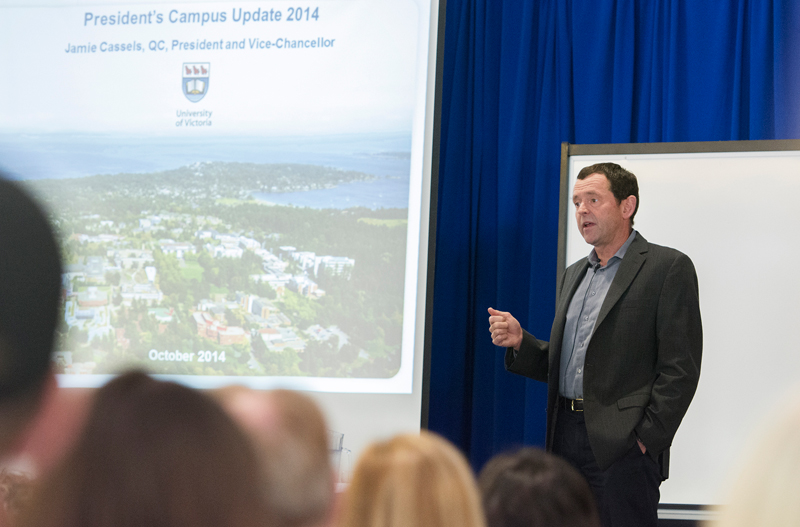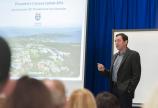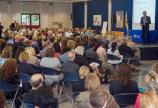President Cassels emphasizes need to sharpen focus and build on strengths

President Cassels emphasizes need to sharpen focus and build on strengths
UVic has made some big strides in the last few years—in terms of national and international recruitment, research, and graduates’ success—but that’s not to say we’re sheltered from demographic change, competition, and the sustainability challenges facing post-secondary institutions, UVic President Jamie Cassels said during an Oct. 7 Campus Update session.
The town hall-style event—continuing the engagement and dialogue initiated during Cassels’ Campus Conversations last year—took place in the Michele Pujol Room in the SUB, which was packed with more than 300 faculty, staff and students. Cassels spoke for 30 minutes and then fielded a variety of questions from the audience for another three-quarters of an hour.
While he was eager to celebrate the university’s accomplishments, Cassels balanced the discussion with the need to work together to meet current challenges—and be ready to take advantage of opportunities when they arise.
The session tackled issues such as how do we as an institution continue to thrive, nationally and internationally, in a fiercely competitive post-secondary environment? And how do we maintain and enhance quality of the student experience during times of constrained economic resources?
Capacity and demographics driving change
Cassels began by outlining the challenge posed by increased university capacity across Canada coupled with a projected decline in youth population. Emphasizing the need to ensure that students from across Canada and around the world see UVic as a university of choice, Cassels explained, “We are starting from a position of real strength. [UVic] is a destination university, our enrolments are strong, our national and our international reputation is increasing, we have core strength in both our teaching and our research accomplishments, and we have differential strengths as well. . . . real reasons why people would choose the University of Victoria.”
Among those reasons, said Cassels, are our size—big enough to offer comprehensive programs and small enough for a more personalized working and learning environment—our research accomplishments, the enrichment of graduate and undergraduate education by that research culture, our extraordinary faculty, and the wealth of experiential learning opportunities for students. Several times in the discussion, he returned to the importance of focusing on student success.
Cassels also addressed the challenge of the “systemic deficit” where costs rise faster than revenues from government grants and tuition. Acknowledging that resource challenges have created concern across campus among faculty and staff who are committed to the university’s mission, Cassels outlined the need to carefully align resources with priorities, “by being more rigorous, more evidence-informed and more transparent about how we use our resources, and more focused on what our strengths are and how we want to build our strengths.”
Tools and transparency
A more strategic, transparent and evidence-based approach to managing resources will be made possible by a new enhanced planning tools project currently underway, which Cassels cited as providing support for UVic decision-makers at the unit, faculty and division level to align resources with our priorities and overall mission. Greater transparency will also enhance internal communications—providing faculty and staff with the information they need and opportunities for input and influence.
Also in the works is an updated Strategic Research Plan, about to launch into its consultation phase. In the last 15 years, explained Cassels, universities have been transformed by an expanded research agenda, and faculty and staff are now working in a complex environment of regulatory and accountability requirements. The plan will assess support and services for faculty, establish benchmarks and assess strengths to be ready for new opportunities; and address ways to enhance social impact, knowledge mobilization and innovation.
Reaffirming the core value of universities
Cassels identified social anxiety about the value of post-secondary education as an additional challenge facing universities. “There’s an interesting governmental, policy and media narrative expressing some skepticism about the value of what we do—expressing some concerns about the escalating costs of university, of education and research, and skepticism about the benefits.”
The solution is not to be defensive in the face of this growing anxiety, the president explained, but to be responsive to those concerns and to “get in front of the curve and reaffirm our social mission” in broad and inclusive terms. He referred to what he called the “autonomy/accountability bargain”—emphasizing that universities have been allowed great independence to shape their programs, and that independence is based on our willingness to be accountable and socially responsive. He emphasized that we can continue to prove our social value by supporting strong programs that do indeed produce job-ready students—and by continuing to offer programs across the disciplines of the arts and sciences that have different academic objectives, noting that those programs also prepare graduates for “the long game” of an intellectually engaged existence and enhanced life prospects. Cassels used graphs to punctuate his point, showing that 94 per cent of UVic alumni are employed in fields related to their studies within two years of graduating.
Cassels also referenced the vital social, economic and technological impacts of research as fundamental to our societal contribution, noting the opportunity to better benchmark and communicate those impacts.
“We want to make a difference, and we can be trusted to make a difference,” says Cassels. Promoting strong stories and key messaging, much of which is currently being shaped by The UVic Difference positioning project, will help us to seize control of our future, and in turn will help us continue to recruit students, funding agencies philanthropists and public support.
Overall, the university must continue to always look for ways to maintain and sustain its core strengths and functions.
“This is our challenge,” says Cassels. “We need to work together to ensure that we do continue to enhance the quality of what we do. But we’re starting from an extraordinarily strong position, that I’m utterly confident that we’ll be able to do that.”


